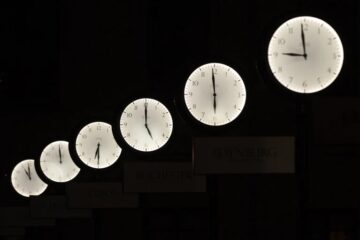Lilly Tozer in Nature:
 How the brain processes visual information — and its perception of time — is heavily influenced by what we’re looking at, a study has found. In the experiment, participants perceived the amount of time they had spent looking at an image differently depending on how large, cluttered or memorable the contents of the picture were. They were also more likely to remember images that they thought they had viewed for longer. The findings, published on 22 April in Nature Human Behaviour1, could offer fresh insights into how people experience and keep track of time. “For over 50 years, we’ve known that objectively longer-presented things on a screen are better remembered,” says study co-author Martin Wiener, a cognitive neuroscientist at George Mason University in Fairfax, Virginia. “This is showing for the first time, a subjectively experienced longer interval is also better remembered.”
How the brain processes visual information — and its perception of time — is heavily influenced by what we’re looking at, a study has found. In the experiment, participants perceived the amount of time they had spent looking at an image differently depending on how large, cluttered or memorable the contents of the picture were. They were also more likely to remember images that they thought they had viewed for longer. The findings, published on 22 April in Nature Human Behaviour1, could offer fresh insights into how people experience and keep track of time. “For over 50 years, we’ve known that objectively longer-presented things on a screen are better remembered,” says study co-author Martin Wiener, a cognitive neuroscientist at George Mason University in Fairfax, Virginia. “This is showing for the first time, a subjectively experienced longer interval is also better remembered.”
Sense of time
Research has shown that humans’ perception of time is intrinsically linked to our senses. “Because we do not have a sensory organ dedicated to encoding time, all sensory organs are in fact conveying temporal information” says Virginie van Wassenhove, a cognitive neuroscientist at the University of Paris–Saclay in Essonne, France. Previous studies found that basic features of an image, such as its colours and contrast, can alter people’s perceptions of time spent viewing the image. In the latest study, researchers set out to investigate whether higher-level semantic features, such as memorability, can have the same effect.
More here.
